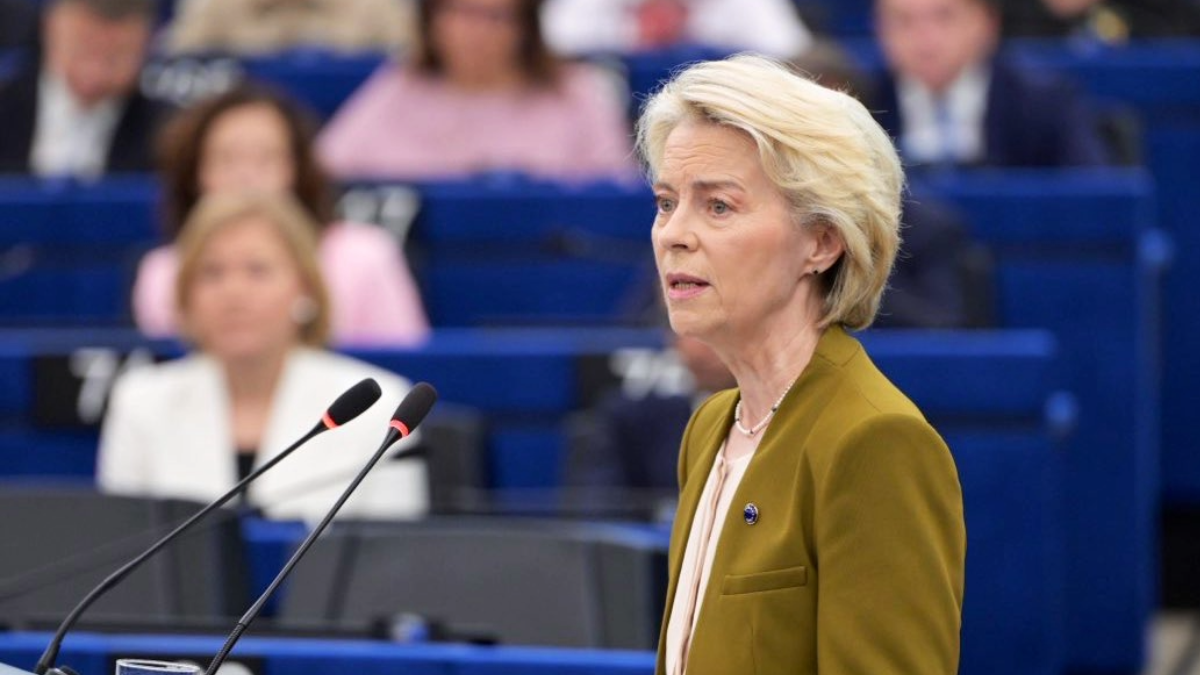State of the Union 2025: What’s Ahead for Tech in Europe
Ramsha Jahangir / Sep 10, 2025
European Commission President Ursula von der Leyen delivers the 2025 State of the Union address at the European Parliament in Strasbourg on September 10, 2025. Source: X
Today, European Commission President Ursula von der Leyen delivered her 2025 State of the Union address to the European Parliament in Strasbourg, outlining the Commission’s priorities for the year ahead amid rising geopolitical tensions and the drive to establish a more independent Europe.
“Battle lines for a new world order based on power are being drawn right now. So, yes, Europe must fight,” von der Leyen declared, emphasizing what she said is the urgent need for the continent to take responsibility for its own defense and security as well as technologies that will fuel European economies. This, she said, must be Europe’s “Independence Moment.”
The European Commission president’s message aligns with recent calls from leaders such as Italian Prime Minister Giorgia Meloni and French President Emmanuel Macron, who have urged Europe to assert itself more forcefully or risk losing influence on the world stage.
While von der Leyen expressed strong ambitions for European sovereignty, her speech offered nothing concrete or new on technology. These were the most notable highlights from the speech:
Defending Europe’s right to regulate
The Commission president made clear that the EU will not compromise on its right to regulate tech companies, even in the face of mounting pressure from the US President Donald Trump’s administration.
"I want to be crystal clear on one point: whether on environmental or digital regulation, we set our own standards, we set our own regulations," she said, defending the bloc’s right to decide for itself. Trump most recently threatened retaliation over a €2.95 billion fine imposed on Google, the second-largest ever issued by the Commission, following a four-year investigation into the company’s alleged abuse of dominance in the adtech market.
‘European’ AI
European-made AI is key to sovereignty, von der Leyen warned, calling it “essential for our future independence.”
To support this goal, the Commission is backing the creation of AI “gigafactories” across the bloc, which will be equipped with over 100,000 advanced AI processors. According to the Commission’s State of the Union report, it has received a total of 76 expressions of interest proposing to set up AI gigafactories in 16 Member States across 60 different sites. The Commission is also planning a Cloud and AI Development Act next year aimed at expanding Europe’s cloud infrastructure. This week, Von der Leyen said in her address that she would meet with CEOs of leading European tech firms, just days after industry group DigitalEurope and 39 executives unveiled a new AI and Tech Declaration, which she welcomed.
EU eyes age limits for social media use
Von der Leyen signaled a potential crackdown on how young people access social media, raising concerns about the platforms’ impact on children’s mental health and safety. “I strongly believe that parents, not algorithms, should be raising our children,” she said.
She also criticized what she called the “tsunami of Big Tech flooding their family homes” and highlighted how some algorithms “prey on children’s vulnerabilities with the explicit purpose of creating addictions.”
Drawing a parallel with age limits on smoking, drinking, and adult content, von der Leyen said it’s time to consider similar restrictions for social media access. Referencing efforts already underway in Australia, she announced plans to commission a panel of experts by year-end to advise on the best way forward for Europe. “We will approach this carefully and listen to everyone,” she added, underscoring the EU’s commitment to prioritizing families over profits: “Europe believes in parents, not profits.”
Regulatory cuts continue despite widespread concerns
Von der Leyen emphasized the importance of making business easier in Europe, saying, “Less paperwork, less overlaps, less complex rules” are key to supporting companies. She praised the ongoing omnibus initiatives, which she said will cut €8 billion in bureaucratic costs annually. Looking ahead, she pointed to a digital euro as an example of innovation to ease business and consumer transactions and mentioned that “further omnibuses are on their way – for example on military mobility or digital.”
Despite strong pushback from civil society, trade unions, and public interest groups, including a joint statement from 470 organizations warning that the Commission’s strategy risks dismantling key protections for labor, social and human rights, digital rights, and the environment, the deregulatory agenda appears to be moving forward unabated.
“Nine months into its term, it’s clear that the Commission’s new 'unprecedented simplification effort' really means ‘deregulation’,” the groups wrote in the statement sent to von der Leyen, the European Commissioners, and EU Member States ahead of the speech today. The statement cautioned that the planned wave of regulatory cuts over the next four years could undermine years of progress on environmental and social policies, as well as digital and climate rights.
Authors
